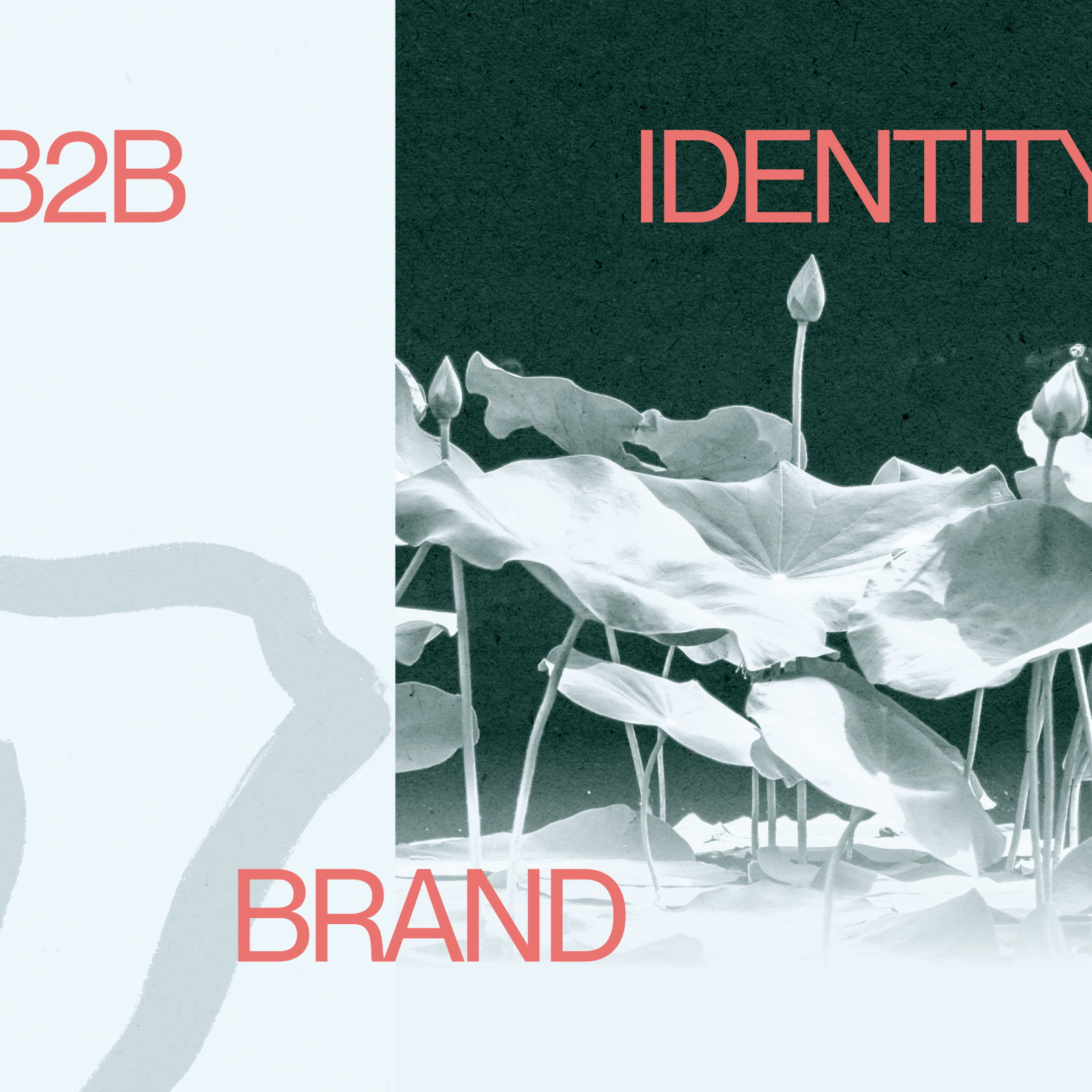Outline:
Every business owner knows that without a tight-knit B2B brand identity it is impossible to build a successful company. In respect that the B2B sector is known for its high competitiveness, the approach to branding B2B transcends traditional boundaries of marketing. It is evolving into a cornerstone of strategic business differentiation and client engagement.
In this article our B2B web design agency reveals the critical role that B2B brand identity plays in defining a business’s presence in the marketplace and in building sustainable relationships with a discerning professional audience. We will demystify the intricacies of how meticulously developed branding strategies foster genuine connections with target clients.
The Concept of B2B Brand Identity
When you immerse into modern commerce, the idea of B2B branding is strongly important for understanding how to navigate business-to-business marketplace successfully. At its core, B2B brand identity represents the collective elements that a company uses to present itself to its business clients and differentiate from competition. It contributes to crafting a comprehensive persona that resonates with other businesses on a strategic level.
In practice, B2B branding involves building a distinct and lasting perception of your business clients. It encapsulates everything from the mission, values, professionalism to the quality and reliability of your B2B services and products. It clearly communicates what you sell and what you stand for, thus determining it as a critical factor in achieving trust and higher credibility.
The journey towards achieving the best B2B branding is intricate and demands a deep understanding of your market, competitors, and customers. The best B2B branding strategies are those that achieve a perfect alignment between a company’s identity and its target audience’s needs and expectations. This alignment is crucial for fostering strong relationships that transcend mere transactions, paving the way for long-term partnerships and growth.
A strong b2b brand identity serves as a foundation for all communications and interactions within the B2B space. That’s why it influences how a business approaches marketing, sales, customer service, and even internal culture.
By consistently conveying your brand identity across all touchpoints, you boost your market position and emphasize value proposition, making your brand more memorable and preferred among business clients. As the marketplace continues to expand, so too must B2B brand identity strategies, always with an eye towards innovation, relevance, and genuine connection.
How Branding Influences B2B Partnerships
Having answered the question “What is B2B branding?”, it is high time to identify the distinct benefits branding gives in shaping and sustaining business relationships within the B2B domain.
Building the Bridge of Trust through a B2B Brand Strategy
In the B2B, transactions are often complex and high-stake. That’s why the value of trust cannot be overstated. A strategic approach to branding showcases a company’s commitment to excellence, reliability, and mutual success. An original brand identity communicates a promise, setting the stage for fruitful partnerships based on shared values and objectives.
Standing Out in a Hyper-Competitive Market
With an ever-increasing number of players in the B2B market, a unique brand identity serves as a beacon, guiding potential partners through the noise. It highlights a company’s unique selling propositions and core competencies, making it easier for like-minded businesses to find and align with them. Effective branding thus becomes a magnet, attracting strategic partnerships that can propel business growth.
Streamlining Partnership Alignment
A clear and coherent brand message simplifies the alignment process between potential B2B partners. It ensures that from the outset, both parties have a mutual understanding of each other’s business ethos, goals, and what they bring to the table. This clarity fosters smoother collaborations, where energies are focused on achieving common goals.
Nurturing Loyalty and Longevity
Beyond the initial engagement, a strong B2B brand identity plays a pivotal role in maintaining and deepening B2B partnerships. It acts as a constant reminder of the partnership’s value and reinforces the benefits of ongoing collaboration and encouraging loyalty. This cultivates a network of advocacy within the industry.
Inspiring Innovation
Lastly, a dynamic brand strategy encourages both parties to continually strive for innovation. It creates an environment where partners are motivated to bring their best to the table, driving the partnership towards new heights of creative vision and problem-solving. This shared commitment to innovation ensures that the partnership remains relevant and ahead of market trends.
Branding in the B2B sector is much more than a marketing asset—it is a fundamental element of strategic partnerships. It builds trust, ensures alignment, encourages loyalty, and drives innovation.
Distinctive Techniques to Transform the B2B Brand Identity Impact
A customer’s journey from awareness to decision can be significantly influenced by the strength and clarity of your brand. Now, we will delve into how innovative business to business branding can remodel the way businesses engage with their clientele, setting a path that not only informs but also inspires and increases loyalty.
Storytelling with Purpose
Leveraging your brand’s unique history and milestones, storytelling becomes a robust tool to forge a deeper connection with your B2B audience. This narrative approach is about weaving a compelling story that encapsulates your brand’s ethos, challenges overcome, and the milestones achieved. It’s an invitation for your target audience to see themselves as part of your journey, fostering a deeper emotional investment in your brand’s success.
Consistency Across Touchpoints
Brand consistency is the thread that ties all your interactions together, presenting a unified image to your audience. This extends beyond visual elements to include the tone of voice, messaging, and even the experience customers have when they reach out for support. When every touchpoint reflects your brand’s core identity, it not only enhances brand recall but also builds a strong, coherent brand image that underscores your market position.
Educational Content
Being seen as a thought leader involves more than just claiming the title; it requires a commitment to providing value through educational content. This could take the form of industry reports, insightful blog posts, webinars, or even in-depth guides that address specific challenges within your industry. By consistently delivering content that adds value, you position your brand as an authoritative source of information, encouraging trust and long-term engagement.
Personalization and Customization
In the B2B world, where needs and challenges can be highly specific, personalization becomes key. This goes beyond using a client’s name in communications—it’s about tailoring your messaging, solutions, and even the content you share to align with the distinct needs of each client. This level of customization shows a genuine involvement and commitment to meeting your clients’ unique requirements, enhancing their experience and satisfaction with your brand.
Leveraging Digital Platforms
In the digital age, a strong online presence is essential. Social media engagement, search engine optimization, and digital advertising are all ways to ensure your brand remains visible and accessible to your audience. However, it’s not just about presence; it’s about meaningful communication with your audience, using these platforms to tell your story, highlight your expertise, and interact with clients and prospects in real-time.
Incorporating these extended strategies into your business-to-business branding creates a comprehensive approach that not only emphasizes your brand’s strengths and values, but also resonates deeply with your target audience, leading to successful B2B relations.
Real-World B2B Branding Successes from Ester Digital
Our recent case studies illuminate how targeted branding practices can catalyze these outcomes across diverse sectors.
For the Certus Cybersecurity project, the approach was centered around creating a digital presence that mirrors the precision and reliability of their security services. This was achieved through a meticulously designed website and presentation materials that not only conveyed professionalism but also consistency across all client touchpoints. The result was an enhanced company image that improved client engagement and positioned Certus as a trusted leader in their field. This illustrates how integrated branding efforts can elevate a company’s credibility and facilitate clearer communication with the target audience.
Lupovis branding strategy involved crafting an immersive, thematic website experience that directly reflects the innovative essence of their cyber deception products. The new branding, including a dynamic website and updated logo, not only aligned with their cutting-edge solutions but also differentiated them from competitors. This rebranding effort led to increased recognition and validation from both investors and customers, showcasing how a strong, relevant brand identity can amplify market presence and customer loyalty.
Lastly, SalesHero’s branding transformation underlines the importance of a unique and cohesive visual identity. By integrating fantasy and futuristic elements into their branding, we not only captured the imagination of their audience but also created a memorable brand experience. This not only facilitated stronger customer engagement but also supported their educational goals, illustrating the direct impact of distinctive branding on customer retention and brand loyalty.
These case studies collectively demonstrate that effective B2B branding is not just about aesthetics but a strategic investment that, when executed correctly, can lead to significant business outcomes such as enhanced market position, improved customer engagement, and increased trust and loyalty among clients.
On a Final Note
In general, effective branding serves as the linchpin in establishing trust, setting a business apart in crowded markets, and cultivating a journey that resonates deeply with business clients. It is evident that in the nuanced arena of B2B engagements, where choices are deliberate and relationships are paramount, a meticulously developed branding strategy is critical.
So, investing in a branding strategy for B2B business is a strategic input to securing a legacy of success and influence. If you want to take this step, contact us and we will assist you.





